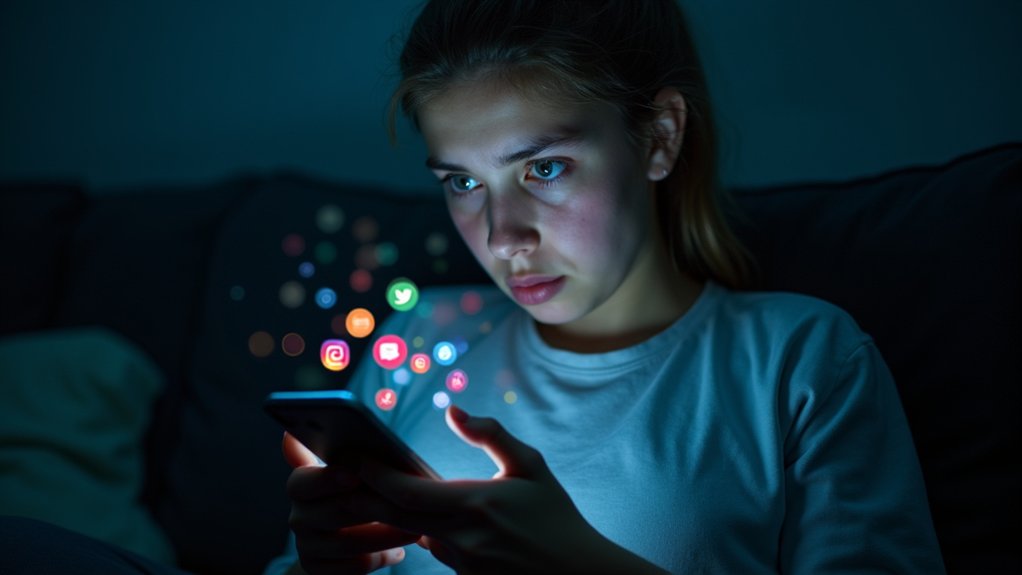Social media has become a major part of daily life, shaping how people connect and view themselves. Understanding how social media affect mental health today is essential because these platforms offer both benefits and risks. On one hand, social media provide spaces for support and sharing valuable information. On the other hand, they can increase anxiety and feelings of isolation for many users. By exploring how social media affect mental health today, we can better understand the impact of digital apps on overall well-being and develop healthier online habits.
Social media plays a significant role in shaping mental health today. Using social media can have positive effects on mental health by helping people build connections and find support networks.
On the other hand, social media can also lead to negative impacts like increased anxiety, depression, and stress, especially due to social comparison and the fear of missing out (FOMO).
Understanding how social media affects mental health is important for managing its use in a healthy way. By recognizing both the benefits and risks, users can make better choices to protect their mental health while enjoying social media.
Positive effects of social media on mental well-being are becoming increasingly recognized.
Social media platforms help users build strong support networks by connecting with others who share similar experiences, which boosts mental well-being.
Additionally, social media raises awareness of mental health topics, reducing stigma and encouraging people to seek help.
Negative impacts: anxiety, depression, and stress
Negative impacts of social media on mental health include increased anxiety, depression, and stress.
Many users experience these challenges as social media apps encourage constant engagement, which can disrupt sleep and reduce focus.
These mental health issues linked to social media use are especially common among teenagers and young adults.
Understanding the negative impacts of social media is important for promoting healthier app habits and improving overall well-being.
The role of social comparison and fear of missing out (FOMO)
The role of social comparison and fear of missing out (FOMO) is a major factor affecting mental health, especially when using social media apps.
Social comparison happens when users compare their lives to others, often through carefully curated posts, which can lead to feelings of inadequacy.
Fear of missing out (FOMO) then pushes people to constantly check these apps to stay updated on events and activities.
This cycle of social comparison and fear of missing out (FOMO) increases anxiety and lowers self-esteem, making mental health worse for many users.
Understanding how social comparison and fear of missing out (FOMO) impact users can help in developing healthier social media habits.
Signs of social media impact on mental health often show up as changes in behavior, like ignoring real-life relationships or dropping productivity.
Emotional signs include feeling more anxious, having low self-esteem, and making constant negative comparisons.
Recognizing the signs of social media impact on mental health early is important because it helps people get professional support before their daily life is affected.
Being aware of these signs can make a big difference in managing the effects of social media on mental health.
Behavioral changes to watch for
How can changes in behavior signal the impact of social media on mental health?
Behavioral changes to watch for include neglecting real-life relationships, increased screen time, disrupted daily routines, and reduced focus on school or work. These shifts often highlight social media’s influence on mental health.
Additionally, risk-taking online for validation and withdrawing from offline activities are key behavioral changes to watch for.
Keeping an eye on these behavioral changes to watch for can help identify potential mental health issues linked to social media use.
Emotional and cognitive symptoms
Emotional and cognitive symptoms are common effects of social media use that can impact users significantly.
These emotional and cognitive symptoms include increased anxiety, mood swings, and trouble focusing. Many users face lowered self-esteem due to negative comparisons and persistent negative thoughts.
Additionally, cognitive overload from constant social media notifications can reduce concentration and decision-making abilities.
Emotional and cognitive symptoms may also show up as feelings of loneliness, sadness, or irritability, highlighting the need for mindful social media habits.
When to seek professional help
When to seek professional help for social media use is an important question to consider.
If you notice that social media use is causing persistent anxiety, depression, or withdrawal from offline relationships, it may be time to seek professional help.
Additionally, declining academic or work performance linked to social media use is a clear sign that professional help can make a difference.
Early intervention by mental health specialists can effectively address issues related to social media use, helping improve coping strategies and overall well-being.
Understanding when to seek professional help for social media use is key to maintaining a healthy balance in your digital life.
Effective strategies for healthy social media use include setting time limits and taking regular digital detoxes to reduce overall screen time.
Prioritizing a positive and supportive online environment is essential for healthy social media use, as it helps minimize exposure to harmful or negative content.
Additionally, managing notifications can decrease distractions and encourage mindful engagement, further supporting healthy social media use habits.
Setting time limits and digital detox tips
Although social media offers valuable opportunities for connection, excessive social media use can negatively impact mental health, making the implementation of social media time limits and digital detox strategies essential.
Setting daily social media usage caps helps reduce screen time, while scheduled breaks promote mental clarity.
Digital detoxes encourage engagement in offline activities, fostering balance and preventing addictive behaviors associated with constant social media interaction.
Incorporating social media time limits and digital detox techniques can significantly improve overall well-being and productivity.
Curating a positive and supportive online environment
Curating a positive and supportive online environment is essential for improving mental well-being when using social media apps.
By curating a positive and supportive online environment, users can engage with uplifting content and foster respectful interactions that make digital spaces safer and more encouraging.
Taking the time to curate a positive and supportive online environment helps reduce stress, limits negativity, and builds psychological resilience in the apps and platforms we use daily.
Managing notifications and reducing distractions
Managing notifications is crucial for social media users who want to reduce distractions and improve focus. Frequent notifications can cause interruptions that break your attention and increase stress.
By managing notifications wisely, such as customizing alert settings or using “Do Not Disturb” modes, you can significantly cut down on distractions. Effective management of notifications not only helps you stay focused, but also promotes better mental well-being by lowering anxiety and boosting productivity during offline time.
Conclusion
Understanding how social media affects mental health today is important for everyone. Social media’s influence on mental health can be both positive and negative. On one hand, social media helps people stay connected and find support, which benefits mental health. On the other hand, social media can increase feelings of anxiety, depression, and stress due to social comparison and FOMO (fear of missing out). To protect mental health, it is crucial to develop healthy social media habits. By setting limits on usage, choosing positive content, and reducing digital distractions, users can improve their mental health and maintain a balanced relationship with social media today.
Amanda Torati is a linguist and postgraduate researcher specializing in the dynamics of digital communication. With a keen eye for emerging technologies, she focuses on deconstructing complex mobile trends and making them accessible through clear, high-quality content. At GoWavesAPP, Amanda applies her expertise to ensure that every app review and tech guide is precise, engaging, and tailored to help users navigate the ever-evolving digital landscape.
YouTube
I tested YouTube on 20 phones for 2 weeks. Here’s what Google doesn’t want you to know
When your YouTube app starts taking 8 seconds to load instead of 3, most people blame their Wi-Fi. They clear their cache. They restart their phone. They might even delete apps to free up space. But what if I told you that the slowdown isn’t accidental, it’s engineered? I spent two weeks running controlled performance […]
YouTube
I audited 50 YouTubers’ real earnings: here’s what nobody tells you about making money on the platform
Want to unlock YouTube’s full earning potential? Discover proven strategies that turn views into real revenue and build lasting success.
Entertainment
I analyzed the top 100 YouTube videos. Their thumbnails & titles break every ‘best practice’ rule
I spent six months obsessively auditing videos. Not just watching — analyzing. Every thumbnail, every title, every description. Every upload timestamp, every tag choice. One hundred videos. The ACTUALLY most-watched across four categories: tech reviews, lifestyle vlogs, financial education, and gaming. Before I go further, I need to be honest about methodology. This isn’t a […]
TikTok
How Apple actually restored TikTok: what the technical workaround reveals about App Store power and political pressure
Not sure why TikTok vanished from your iPhone? Discover quick fixes to restore the app and uncover what might be causing the issue.
YouTube
How to fix YouTube app not working on Android? 7 quick solutions
Get your YouTube app working again on Android with these seven quick fixes—discover the simple solution you might be missing inside.
Instagram
Will Instagram notify Screenshot of story? The truth
Just when you think Instagram alerts you about Story screenshots, discover the surprising truth behind its notification policy and what it means for your privacy.






